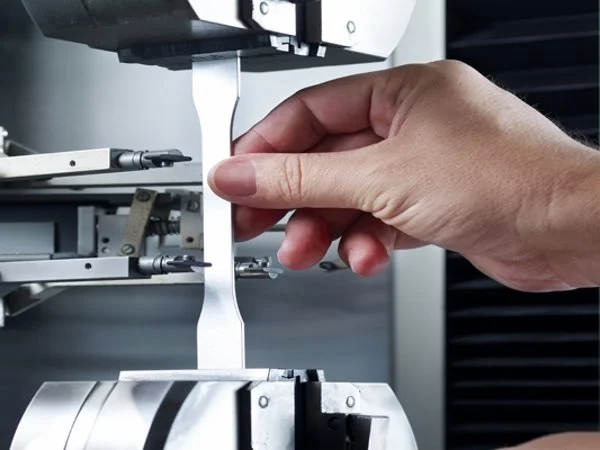EN ISO 6507 Vickers Hardness Test
The EN ISO 6507 Vickers hardness test is a widely recognized method used to measure the hardness of materials, particularly metals and alloys. This non-destructive test provides valuable information on material properties that can influence design decisions, quality control, and process optimization in various industries including oil & gas.
The test involves applying a small indenter (a diamond pyramid) onto the surface of a specimen under a known load for a specific duration. The hardness value is then determined by measuring the depth of the indentation using a microscope or image analysis software. This method offers high accuracy and precision, making it suitable for both research and production environments.
In the context of oil & gas testing, Vickers hardness testing plays a crucial role in evaluating the integrity and performance of materials used in drilling tools, pipe joints, and other critical components. Understanding the hardness properties ensures that these parts can withstand harsh conditions such as high pressure, temperature fluctuations, and corrosive environments found deep within geological formations.
For quality managers overseeing production processes or compliance officers ensuring adherence to international standards, Vickers hardness testing is essential for validating material specifications against design requirements. R&D engineers benefit from this test by gaining insights into how different alloy compositions affect mechanical behavior under varying stress conditions. Procurement teams also find value in leveraging Vickers hardness data when selecting suppliers who meet strict quality criteria.
The versatility of the EN ISO 6507 standard allows for testing various geometries including flat surfaces, spherical surfaces, and even small areas where other methods may not provide reliable results. This adaptability makes it a preferred choice among laboratories specializing in metallurgical & mechanical materials testing within the oil & gas sector.
By employing advanced techniques like digital image analysis and automated microindentation machines, modern labs can achieve consistent reproducibility across multiple samples, enhancing reliability for both internal quality assurance purposes and external regulatory compliance requirements.
Why Choose This Test
The EN ISO 6507 Vickers hardness test offers several advantages that make it an attractive option for laboratories and industries seeking accurate and reliable material property data:
- Precision and Accuracy: With its ability to measure very small indentation depths, the Vickers method provides highly precise readings even on thin sections or small specimens.
- Versatility: The test can be applied to a wide range of materials from soft aluminum alloys to extremely hard carbide steels.
- Non-Destructive: Unlike some other hardness tests, Vickers does not require altering or damaging the sample during testing.
- Standardization: Being part of an internationally recognized standard (ISO 6507), results from this test are widely accepted and comparable across different regions and organizations.
In addition to these benefits, choosing EN ISO 6507 Vickers hardness testing ensures that your laboratory or company meets the highest quality standards expected by stakeholders like regulators, clients, and investors. It demonstrates a commitment to excellence in materials science and engineering practices essential for maintaining competitive advantage in today’s global market.
Environmental and Sustainability Contributions
The use of advanced testing methods like EN ISO 6507 Vickers hardness contributes positively to environmental sustainability by promoting efficient resource utilization. By accurately assessing material properties early in the development cycle, industries can optimize component designs for both strength and weight, reducing overall energy consumption throughout a product’s lifecycle.
For example, in oil & gas applications where equipment must operate reliably under extreme conditions, selecting components made from materials with optimal hardness improves operational efficiency while minimizing waste. This approach not only reduces costs associated with frequent replacements but also decreases environmental impact through reduced resource extraction and processing requirements.
Laboratories specializing in EN ISO 6507 Vickers hardness testing play a vital role in advancing sustainable practices by providing robust data that supports informed decision-making at all levels of the supply chain. Their expertise helps ensure that materials used meet not only current standards but also future expectations regarding sustainability and environmental responsibility.
Competitive Advantage and Market Impact
The ability to perform accurate EN ISO 6507 Vickers hardness testing provides significant competitive advantages in the oil & gas sector. Companies that invest in this capability gain deeper insights into material performance, which can lead to innovations that enhance product reliability and longevity.
For instance, by understanding how specific alloy compositions affect mechanical properties under different operating conditions, manufacturers can develop more robust drilling tools or pipeline systems capable of withstanding harsher environments longer. This not only extends product lifespans but also reduces maintenance costs associated with premature failures.
In terms of market impact, companies offering superior testing services based on internationally recognized standards like EN ISO 6507 stand out to potential clients and partners who value high-quality assurance. Such laboratories attract business from leading oil & gas companies seeking trusted suppliers and collaborators committed to excellence in materials science.
Moreover, maintaining compliance with these standards demonstrates a company’s commitment to integrity and accountability—an important factor when dealing with global regulations governing the industry. By adhering strictly to international norms such as EN ISO 6507, organizations establish themselves as reliable partners capable of delivering consistent results across diverse operational environments.





